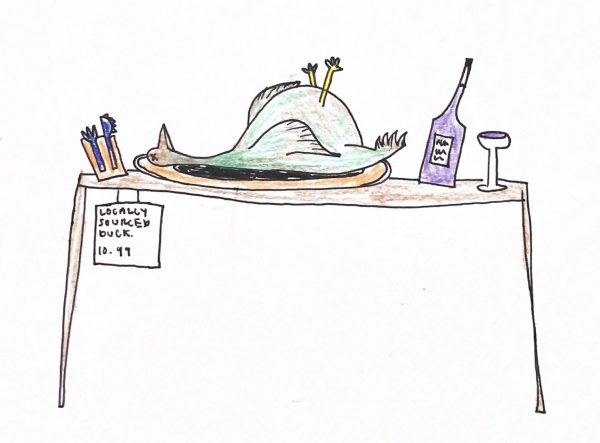Whitman ranks last in sustainability report compared to nine peers
October 22, 2020
Whitman College ranked last when compared to nine peer institutions in the Summer 2020 Sustainability Tracking, Assessment & Rating System’s (STARS) Comparative Report. The report was developed by Campus Sustainable Coordinator Elissa Brown and Sustainable Research Intern Rosa Woolsey to help educate the community on Whitman’s sustainability efforts and to provide solutions for improvement.
STARS is a system developed by the Association for the Advancement of Sustainability in Higher Education (AASHE) that assesses the sustainability of higher education institutions on four main categories: academics, engagement, operations and planning and administration. The final score is based on the percentage of points an institution earns across these categories with the possibility of four additional points from an innovation leadership category. Colleges earn a score out of 100 points that correlates to a rating of bronze, silver, gold or platinum.
Whitman College earned 53.78 points and achieved a silver rating.
Brown and Woolsey created the STARS Comparative Report to break down the STARS rating into subcategories and compare Whitman’s sustainability efforts against its peer institutions. They suggested ways to improve Whitman’s scores by noting the successful programs of peer institutions with higher STARS ratings.
The report summarized the evaluation of Whitman by writing, “Our lowest-rated subcategories are Campus Engagement, Transportation and Investment & Finance; our highest-rated subcategories are Air & Climate, Grounds and Diversity & Affordability. Although these are areas in which we excel, we did not earn full points in any category, so there is still much more to accomplish.”
Whitman’s low ranking did not surprise Sustainability Coordinator Brown. Whitman started focusing on sustainable approaches later than many other colleges. They hired their first sustainability coordinator in 2013 and adopted the first Climate Action Plan in 2016. The highest-ranking college in the STARS Comparative Report, Colby College in Waterville, Maine, introduced their Environmental Advisory Group to advise the college on sustainability efforts in 2000. Still, Brown was impressed with what they have accomplished.
“When I arrived at Whitman in the spring of 2019, I was impressed by how much had been accomplished in a relatively short time — it’s part of what encouraged me to accept this position here,” Brown wrote in an email to The Wire.
Brown emphasized that while the STARS rating is a valuable tool, it is not able to capture all the intricacies of Whitman’s sustainability efforts. Whitman did not earn any points in the subcategory Operations-21: Water Use. Brown explained that this deficiency occurred because Whitman conducted a fully-comprehensive water use inventory for the first time this year.
ASWC Sustainability Committee Co-Chair Sam Kinzel agreed that the STARS rating doesn’t fully encapsulate the efforts being put in at Whitman toward sustainability efforts.
“It doesn’t talk about how long that it took [to make progress] or how much dedication and effort the students and faculty and staff that were behind it really put into it,” Kinzel said.
Despite Whitman’s low score, Kinzel is optimistic about the future of sustainability at the college. Kinzel believes the report is an excellent road map that gives Whitman tangible solutions on how to improve its sustainability efforts.
Discussions on how to improve Whitman’s sustainability efforts have already started.
“The President’s Sustainability Advisory Committee (PSAC) is forming working groups to pursue no/low-cost opportunities identified in this report that we can implement even in this time of unpredictability for the college, particularly in Academics and Engagement — two of our lowest-ranked categories,” Brown said. “Related to Engagement, we initiated the concept of a peer-to-peer network for diversity, equity, inclusion and sustainability that we are now collaborating to develop as an Inclusion Task Force action item.”
These no to low cost opportunities are particularly attractive for colleges as they navigate the financial implications of COVID-19. Chief Financial Officer Peter Harvey expressed this concern in an email to The Wire.
“It will be a challenge to make as much progress as any of us want given the current constraints from the pandemic and the financial ramifications all colleges face in these times,” Harvey said. “We will keep working toward our common goal of a sustainable future.”
Brown explained that the Office of Sustainability relies heavily on collaborations with other groups to make progress across campus.
Kinzel also highlighted several projects that the ASWC Sustainability Committee has been collaborating on with other groups. The committee is partnering with the Diversity, Equity and Inclusion Committee to refresh Whitman’s Sustainability Principles. They also partnered with Planned Parenthood Generation Action to offer free menstrual cups to students to help reduce the amount of trash that feminine hygiene products create.
Rankings for sustainability vary widely by methodology. Whitman ranked 9th in The Princeton Review’s Top 50 Green Colleges for 2021. The report was released Tuesday, Oct. 20. Although The Princeton Review uses AASHE data, their ranking methodology differs from Whitman’s sustainability report, and takes student opinion into account.
Rosa Woolsey previously worked for The Wire as a staff reporter.








